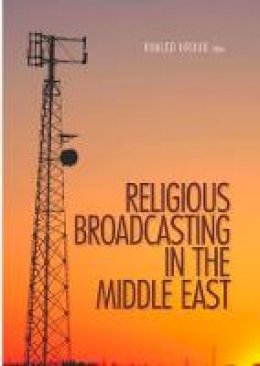9%OFF

Stock image for illustration purposes only - book cover, edition or condition may vary.
Religious Broadcasting in the Middle East
Khaled Hroub (Ed.)
€ 32.99
€ 29.99
FREE Delivery in Ireland
Description for Religious Broadcasting in the Middle East
Paperback. New media flows have sparked a boom of Muslim, Christian and Jewish religious channels in the Middle East. This is a close content analysis of the impact on religious broadcasting in the Middle East. It examines how the highly charged political and religious ferment in the Middle East plays out in the media Editor(s): Hroub, Khaled. Num Pages: 288 pages. BIC Classification: 1FB; APT; HRA; JFD. Category: (UP) Postgraduate, Research & Scholarly. Dimension: 213 x 141 x 24. Weight in Grams: 482.
Over the past decade or so religious broadcasting in the Middle East has been one of the chief beneficiaries of new, transnational media flows and the now commonplace availability of satellite broadcasting technology. Dozens of Muslim, Christian and Jewish religious channels have been established, advocating differing forms of religiosity and shaping public perceptions through their transmission of discussion programmes, preaching, proselytisation pure and simple, and guidelines about how best to live a pious life. Even mainstream leading news channels such as Al-Jazeera and Al-Arabiya have broadcast popular religious shows since their inception. Some of this programming is highly politicised, such as Hamas's Al-Aqsa or Hizbullah's Al-Manar channels; other stations present themselves as apolitical, concerned only with preaching God's word. The highly charged political and religious ferment in the Middle East today has been certainly propitious for such broadcasters as they seek to convey their message. This has in turn reinforced the connection between the dominant 'religious atmosphere' and religious broadcasting. Based on monitoring and content-analysis of some of the region's most influential religious channels and programmes, the contributors to this book offer pioneering insights into this uncharted terrain. They explore the themes, discourses, appearances and the 'celebrities' of this still expanding phenomenon of religious broadcasting in the Middle East.
Product Details
Publisher
C Hurst & Co Publishers Ltd
Number of pages
288
Format
Paperback
Publication date
2012
Condition
New
Number of Pages
288
Place of Publication
London, United Kingdom
ISBN
9781849041331
SKU
V9781849041331
Shipping Time
Usually ships in 5 to 9 working days
Ref
99-10
About Khaled Hroub (Ed.)
Khaled Hroub is Director of the Arab Media Project at Cambridge University.
Reviews for Religious Broadcasting in the Middle East
'Religious Broadcasting in the Middle East is a groundbreaking volume which will soon establish itself as a seminal text in Arab media and cultural studies. Its thirteen chapters cover a wide geography and contextualise religious broadcasting in the Middle East in a conjunctional and interdisciplinary fashion, providing critical, nuanced and empirically based analyses on the subject. This is a much awaited collection that no one specialising in the Middle East can afford to ignore.'
Tarik Sabry, Communication and Media Research Institute, Arab Media Centre, University of Westminster
'This rich and revealing collection of essays goes deep inside the religious television broadcasting which has risen to prominence in the Middle East in recent years. Detailed discussions of programs and stations demonstrate the diversity and importance of these stations, and the messages they are sending across the airways.'
Marc Lynch, Associate Professor and Director of the Institute for Middle East Studies, George Washington University
Tarik Sabry, Communication and Media Research Institute, Arab Media Centre, University of Westminster
'This rich and revealing collection of essays goes deep inside the religious television broadcasting which has risen to prominence in the Middle East in recent years. Detailed discussions of programs and stations demonstrate the diversity and importance of these stations, and the messages they are sending across the airways.'
Marc Lynch, Associate Professor and Director of the Institute for Middle East Studies, George Washington University
